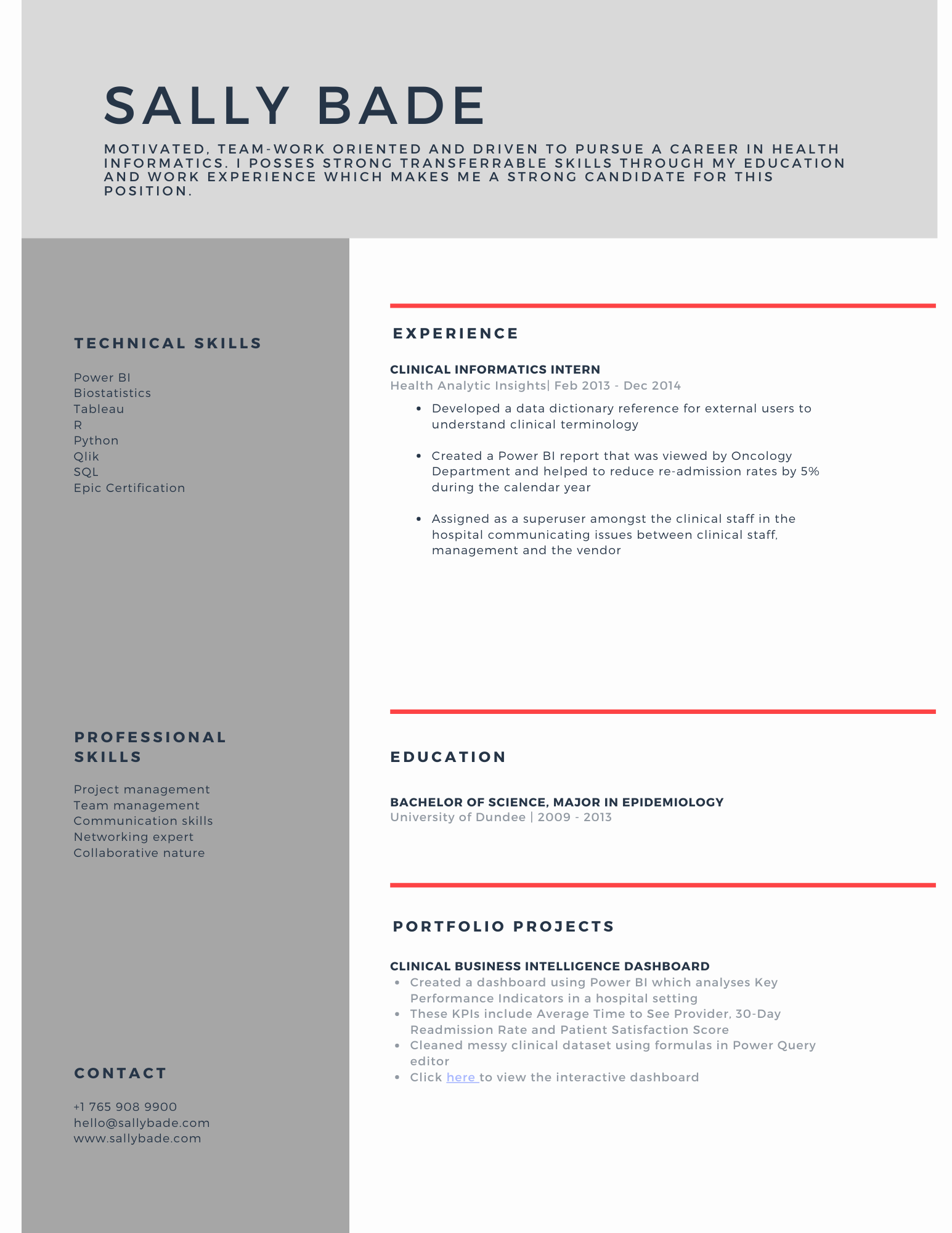When it comes to applying for health informatics jobs there are some considerations that would be best to add to your resume and cover letter to help increase your chances of obtaining the job.
I recently did a resume review for someone who was a recent health informatics graduate and had a background as a registered nurse. She had a wealth of experience but I found some areas that might be helpful for her to expand on in her resume, to better improve her chances of getting a callback from employers. In this blog post, I am going to highlight some of those areas. If you would like to get your resume reviewed for free, you can email me at healthanalyticinsights@gmail.com.

In her resume, she had important skills for health informatics professionals listed such as experience with Oracle SQL, SAS and Tableau. Although this is a great first step, I would consider expanding on this and list specific projects (this can also be projects done during school) that incorporate using these skills.
For instance, “I worked on a project which predicted the readmission rates for a hospital, by writing SQL queries and presenting my results in a dashboard using Tableau“.
In her resume, she listed that she had experience working with her facility’s EHR. It’s good to expand on this, what specific EHR vendor do you have experience with? Is it Epic, Cerner or another popular vendor?
This is a key area to expand on, as it puts you at a greater advantage if you are applying to a hospital that already has Epic implemented and you have clinical experience using the front-end of the system.
Becoming a superuser of the EHR is another way to transition into a health informatics role, and having experience with the EHR is beneficial, therefore, I would definitely highlight this skill. Also, if you yourself have experience with an EHR system, ask yourself these questions as you go through your resume:
- What did you do specifically when working with the EHR?
- Were you able to provide any suggestions on how to improve clinical workflow when using the EHR?
- Did you develop any training materials to help clinicians use the EHR?
Finally, in her resume, she highlighted that she collaborated with patients, caregivers and healthcare professionals. The ability to work in an interdisciplinary environment and to be able to present your analytical findings to a non-technical audience, is key for health informatics professionals. Therefore, I asked her to expand on this, strong communication skills are key in this role and highlighting this on your resume, will help you to stand out.
Here is an example resume template for someone applying for a health informatics role: 
In this resume, I have included quantitative measures such as: “Created a Power BI report that was viewed by the Oncology department and helped to reduce readmission rates by 5%“, this gives the hiring manager an understanding of the value that I can replicate for the role I am interviewing for.
In addition, don’t forget to include any transferrable skills that might be relevant, even if it is in another industry. For example, if you were a project manager in another industry, other than healthcare, you might have experience with change management and guiding end-users through system updates. This would be relevant to include if you are looking to transition into health informatics and want to work on a project where they are implementing a new EHR system. I have written a previous blog post here, on a list of roles which can transition into a health informatics role.
Another tip is to add the skills that you have experience with but also, give concrete examples on how you used these tools (e.g. Excel, Power BI, SQL) in another job role, volunteer project or internship. This allows the hiring manager to get a sense of your level of expertise with the tool.
Finally, if you don’t have previous work experience in health informatics, consider creating a clinical business intelligence portfolio project. This is a project where you think of a common problem in health informatics and build a solution. This can be in the form of a dashboard which tracks hospital metrics (e.g. hospital length of stay, patient satisfaction scores) or it could be in the form of building a machine learning algorithm that predicts readmission rates, there are many ideas out there!
The purpose of creating your own clinical business intelligence portfolio project is to show you have the initiative to self-learn. I have linked to a step-by-step video of how to create a clinical business intelligence portfolio project here:
You can then link to your final output in your resume for hiring managers to check out and ask you about during the interview. Best of luck in finding your dream job! Leave a comment down below, what area are you struggling with most, when it comes to obtaining a job in health informatics?
0 Comments